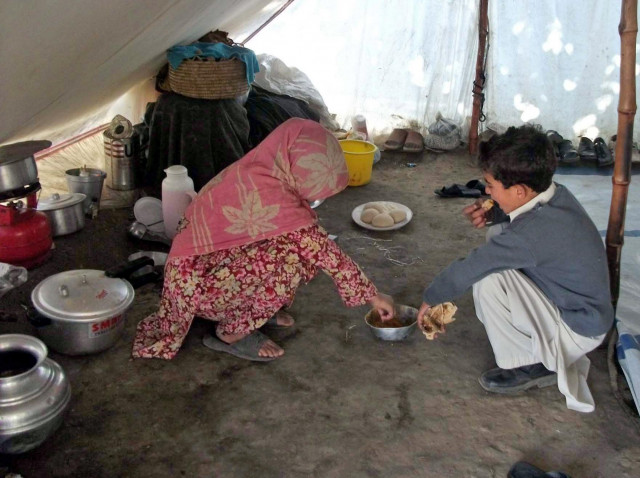Jirga unhappy with rehabilitation efforts
Participants call for efforts by individuals/community, instead of the government, to rebuild Swat, Kohistan.

Disaster and militancy-affected people of Swat and Kohistan districts at a jirga expressed dismay over the inordinate delay in rehabilitation of infrastructure in the disaster-hit areas.
Organised by Idara Baraye Taleem-o-Taraqi (IBT) in collaboration with Centre for Research and Security Studies (CRSS) at Bahrian to assess the rehabilitation process carried out by government and non-government organisations, the jirga was attended by representatives of the civil society, political activists and public representatives of the area.
People from the flood and militancy-hit union councils of Bahrain, Kalam, Utror, Mankiyal, Balakot, Bishigram and Madyan, described the rehabilitation efforts slow, unsatisfactory and insufficient.
They were particularly unhappy with the damaged road connecting Kalam with Madyan and demanded that the single connecting road must be restored for all kinds of traffic before the summer, so as to enable tourists into the area.
Former provincial minister Malik Mohammad Didar said, “The government has drawn an unrealistic roadmap for the reconstruction of the dilapidated infrastructure. The representatives could not mobilise the government on the issues of Swat-Kohistan and both the MPA and MNA have failed to address the hardships being faced by the people of these areas.”
Malik Khurshid, a social activist, said, “The NGOs should focus on sustainable development. More concentration is needed to address real assessment before intervention. They should also avoid duplication and waste of funds.”
Another participant, Haji Zarin Gujar, put emphasis on the immediate need of construction of the link bridges and roads, spread over a distance of more than 70km.
Social worker and educationist Khaista Gul presented the overall deplorable situation of education, owing to the floods. He pointed out that Bahrain High School, destroyed by the 2005 earthquake, still awaits reconstruction, let alone the schools swept away by the 2010 floods.
Gul presented a report that said that more than 30 per cent of the primary schools in the area were non-functional due to lack of proper equipment, check and monitoring.
The speakers unanimously resolved they would unite and select a representative jirga to go forward and address the problems by raising them at every forum, whether provincial, federal, private or public.
CRSS Chairperson Imtiaz Gul told the participants that many of the issues arise due to mal-governance, corruption and sloth because the various institutions, both public and private, do not ensure the involvement of the community, rather avoid it.
He added that many of the problems could be overcome with the support of a powerful civil society such as the jirga institution. He promised full support of CRSS for the cause of these marginalised and neglected communities and stressed the need of effective liaison between organisations such as CRSS and IBT.
At the end, all participants from the six union councils selected a representative jirga of 20 people to sustain the initiative. They assigned IBT with the duty to facilitate and convene the representative jirga. The jirga was of its first kind in the area and was unique in that the people agreed on a sustained initiative for the solution of their problems.
Published in The Express Tribune, April 21st, 2011.



















COMMENTS
Comments are moderated and generally will be posted if they are on-topic and not abusive.
For more information, please see our Comments FAQ